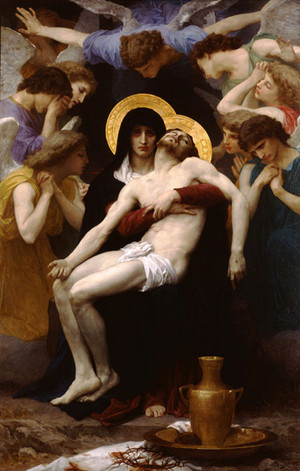Looking Toward Holy Week - The God We Meet
Biblical commentators tell us that the passion narratives were the first parts of the Jesus story to be proclaimed. Each evangelist approaches the narrative with his unique perspective and one would expect an opening scene in the garden of Gethsemane or in Pilate’s courtroom where Jesus receives his sentence, is then tortured and taken off to Calvary for his execution. But one image by far precedes all of these.
 Jesus is the “Suffering Servant” of Isaiah who speaks to a people enslaved. Their exile is that of weakness and failure. Jesus reaches out to them in solidarity. But they would rather stay imprisoned in their own notions of God and holiness and of what’s right and wrong. They are trapped in their own self-righteousness. And despite the hostility he meets, Jesus is not a defenseless victim. He remains faithful to his mission. His passion concretely speaks the words of Isaiah: "I gave my back to those who beat me, my cheeks to those who plucked my beard, my face I did not shield from buffets and spitting."
Jesus is the “Suffering Servant” of Isaiah who speaks to a people enslaved. Their exile is that of weakness and failure. Jesus reaches out to them in solidarity. But they would rather stay imprisoned in their own notions of God and holiness and of what’s right and wrong. They are trapped in their own self-righteousness. And despite the hostility he meets, Jesus is not a defenseless victim. He remains faithful to his mission. His passion concretely speaks the words of Isaiah: "I gave my back to those who beat me, my cheeks to those who plucked my beard, my face I did not shield from buffets and spitting."
This strong sense of commitment to the task entrusted to him rises from the interior strength God renews in him each day. He discovers for himself and proclaims to others the God who is always willing to speak again and always willing to forgive. And that is the God we meet during Holy Week as we are present to Jesus’s living out of his role as God’s servant.
The word “passion” has roots in words meaning “suffering” and “being acted upon.” There are many people in our world who suffer or have been victimized at the mercy of others. Daily we are witnesses to brutal and unprovoked war in the Ukraine and the constant stories of death and destruction in Gaza, all of which heightens our sense of fear and helplessness. But we also suffer from the pressures of political, economic and social systems, which drain our energy and suffocate our faith.
“Passion” in English also suggests having strong feelings. In this sense Jesus was an initiator, one who felt strongly about what he was to do and went about doing it. He was a passionate lover of God and of humanity, and this passion energized and forged his determination to continue on the path God gave him - to preach God’s love for the outsider. No opposition could prevent this passionate savior from completing his task for us, even if it meant his death.
The Passion of Christ is not just a past event that we look back upon. We’re not just recalling the past. Our proclamation of the Passion must affect our present and our future. The Resurrection is "not yet." It doesn’t quickly rush to “solve” the pain we experience for our lives dead ends. We need to identify with the loss and bewilderment of the disciples because at times we are also left with unanswered questions. We must always identify with Jesus, receiving strength from his endurance under his own passion.
Jesus comes to us when our hope is shattered and we want to walk away. He comes to us in the poor and the sick and the frightened and the lonely. He comes to us when we grow weak and stumble and he lifts us up with the assurance that he will stay with us through the valley of death until we, too, will rise with him to the fullness of life.